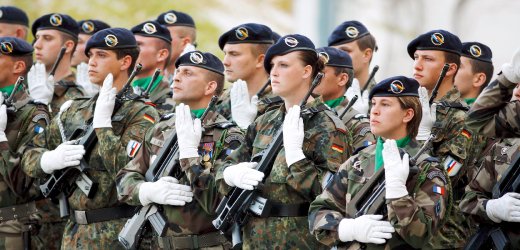
From Volker Rühe and Ulrich Weisser, der Spiegel: The mistakes were made intentionally and against every informed advice. In its coalition agreement, the new German government of the Christian Democratic Union, the Christian Social Union and the Free Democratic Party agreed to reduce the period of compulsory military service from nine months to six months until Jan. 1, 2011. The military leadership considered this approach to be the least effective and most expensive solution. Under these conditions, experts would have preferred to dispense with compulsory military service altogether.
The mistake has now become law, and the FDP has achieved its goal of beginning the phase-out of conscription. The federal government has cut compulsory military service to the point of senselessness, and thus destroyed it. …
With its radical reduction plans, Germany is merely reinforcing an unfortunate tendency to shift from one extreme to the next. After Germany’s overwhelming military had terrified our neighbors in the last century, we then switched to being a freeloader within the framework of European security. A fundamental restructuring of the Bundeswehr is not something that Germany can pursue alone. We must remain capable of fulfilling our obligations as part of the NATO alliance and the European Union.
Germany, the most populous and prosperous country in Europe, must play an appropriate role in guaranteeing European security within NATO and the EU. It cannot assume that the French, British, Poles and Italians will make up for what Germany no longer wants to do. Why should European countries with less economic power than Germany do more for Europe’s security in the long run than we do? …
It is clear that the Bundeswehr must also play its role in consolidating Germany’s budget. But it is irresponsible to reduce the Bundeswehr to 150,000 troops for reasons of economy. It makes more sense to reduce the number of professional soldiers by no more than 20,000, thereby making it possible to maintain a force of at least 180,000 professional soldiers in the long term. The German army must have at least six full-time, operational brigades. This makes it possible to conduct, together with our allies, two campaigns at the same time.
In this new Bundeswehr, the relative proportions of the three branches of the military must be revised. In particular, the experience gained from missions in the Balkans and Afghanistan in recent years has shown that our army is too small to bear the brunt of the missions, that the air force is somewhat too large and consumes too much money, and that the navy ought to concentrate on a limited number of tasks.
Volker Rühe, 67, was German defense minister from 1992 to 1998 and is a member of the conservative Christian Democratic Union. Retired Vice Admiral Ulrich Weisser, 71, was head of the policy and planning staff within the Defense Ministry during the same period. Translated from the German by Christopher Sultan. (photo: Christian Thiel/der Spiegel)
Image: spiegel%207%2029%2010%20Franco%20German%20Brigade.jpg
